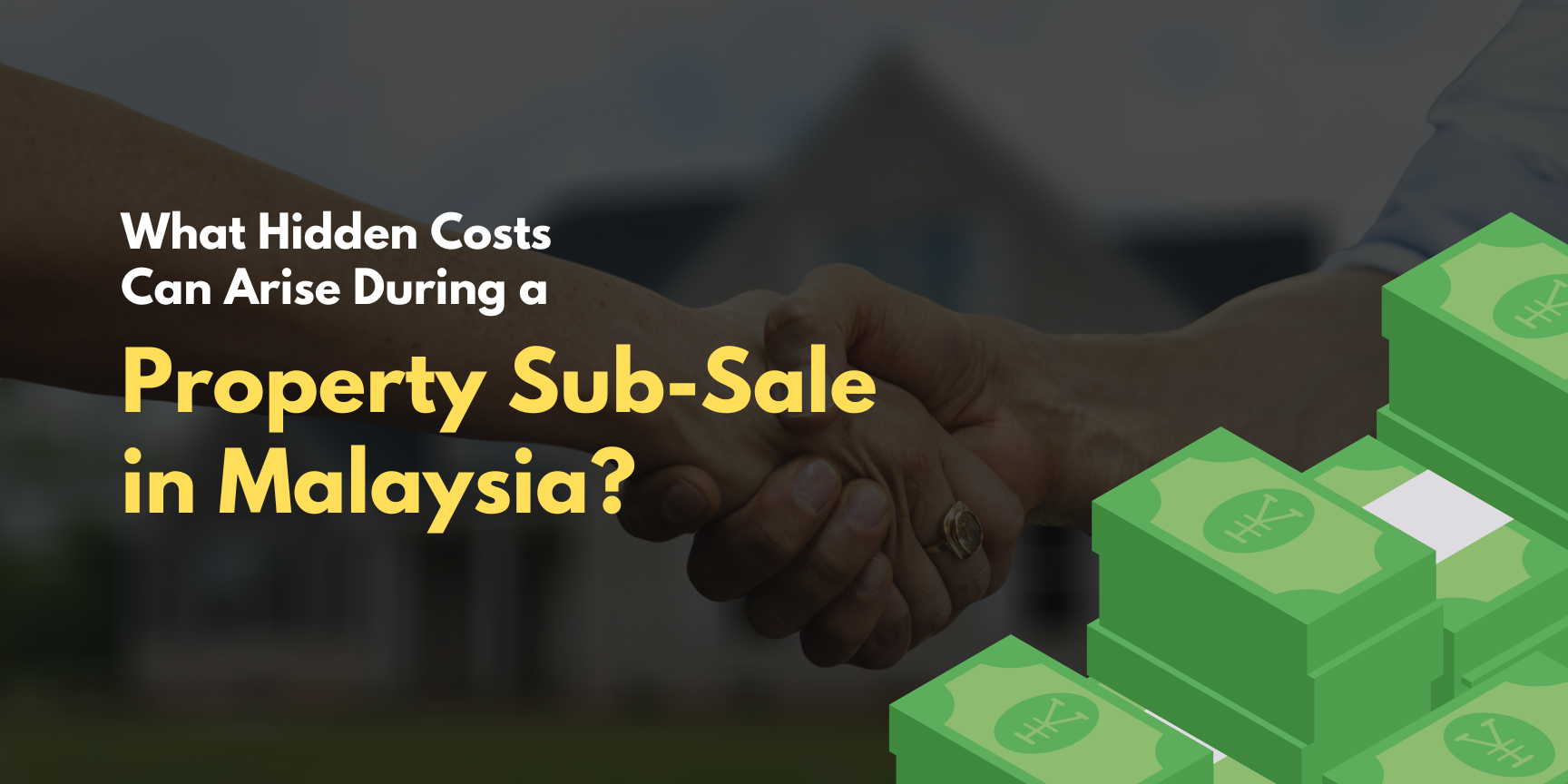
Property sales in Malaysia can be very profitable, particularly in the secondary market (sub-sale). However, the process is not without difficulties, particularly regarding hidden costs that can catch sellers off guard. Understanding these potential expenses is crucial for anyone looking to sell their property, ensuring that they can budget effectively and avoid any unpleasant surprises.
The Sub-Sale Process: An Overview
A sub-sale refers to the transaction of a property that has already been owned by one or more individuals and is now being sold to a new buyer. Unlike new property sales directly from developers, sub-sales involve additional steps and costs, making the process potentially more complex and costly for the seller.
The process typically starts with signing a Sale and Purchase Agreement (SPA), followed by the necessary legal procedures, such as title transfer and settling any outstanding payments. While this might sound straightforward, multiple hidden costs can arise at different transaction stages.
Hidden Costs to Watch Out For
1. Real Property Gains Tax (RPGT): One of the most significant hidden costs in a property sub-sale is the Real Property Gains Tax (RPGT). RPGT is a tax imposed on the profit made from selling a property. The rate of RPGT depends on how long the seller has owned the property:
RPGT Rates(Disposal) | Malaysian Citizens & PRs | Non- Citizens & Foreigners | Companies |
1st year | 30% | 30% | 30% |
2nd year | 30% | 30% | 30% |
3rd year | 30% | 30% | 30% |
4th year | 20% | 30% | 20% |
5th year | 15% | 30% | 15% |
Thereafter | 0% | 10% | 10% |
It’s important to calculate the potential RPGT before selling to ensure that the profit margin is still attractive after tax deductions.
Tips: Calculate the RPGT early using available online calculators or consult with your legal advisor to estimate your tax liability based on how long you’ve owned the property. This helps ensure that the sale remains profitable after taxes.
2. Legal Fees: Legal fees are another major cost that sellers need to consider. These fees cover the drafting of the SPA and the handling of various legal formalities. The fee is typically calculated as a percentage of the property’s sale price, usually around 1% to 1.25%.
Sellers will normally try to save legal fees by appointing the buyer’s lawyer to handle the legal work. While the buyer’s lawyer may do so, the buyer’s lawyer is acting on the buyer’s interest only.
Tips: Don’t be penny wise and pound foolish. You do not want to sign SPA with terms that are unfavourable to you. Engage a lawyer early to protect your rights.
3. Settlement of Outstanding Loans: If the property being sold still has an outstanding mortgage, the seller needs to settle this loan before the sale can be completed. This may involve early repayment penalties, depending on the terms of the loan agreement. Sellers should check with their bank for any such penalties or fees and factor these into their budget.
Tips: Contact your bank early to get a clear breakdown of any early repayment penalties or fees. Include a clause in the SPA to address these costs and protect yourself from unforeseen charges.
4. Renovation Costs and Repairs: To make a property more attractive to buyers, sellers often invest in renovations or repairs before listing it. While this can help achieve a higher sale price, it also represents an additional cost that can eat into the profit margin. Sellers should carefully consider the return on investment for renovations and avoid overspending.
Tips: Focus on cost-effective renovations that offer a high return on investment (ROI). Consider minor upgrades like repainting or fixing small issues, which can boost the property’s appeal without excessive spending. For major renovation, keep all your receipts as these may be tax deductible when paying RPGT.
5. Real Estate Agent Fees: Many sellers work with a real estate agent to help find buyers and manage the sale process. While this can be incredibly helpful, it comes at a cost. Agent fees in Malaysia typically range from 2% to 3% of the final sale price. It’s important to factor in this expense when calculating the net proceeds from the sale.
Tips: Discuss the agent’s commission rate upfront and ensure it’s clearly stated in your agreement. Consider negotiating a fixed fee if the sale price is high to avoid large commissions.
6. Utility and Maintenance Fees: Before handing over the property to the new owner, the seller is responsible for ensuring that all utility bills, such as water, electricity, and maintenance fees, are fully paid. Any missing payments must be cleared to avoid complications during the transfer of ownership. Even though there are little expenses on their own, they can build up, particularly if the property has been unoccupied for a while.
Tips: Obtain a detailed list of all outstanding utility bills and maintenance fees before listing the property. Clear these payments early to avoid delays in the transfer of ownership. Get hold of an experienced law firm to guide you through this process.
7. Quit Rent and Assessment Tax: In Malaysia, property owners pay quit rent (cukai tanah) and assessment tax (cukai pintu). Before the sale, sellers must ensure that these payments are recent. Any outstanding amounts will need to be settled, which can be an unexpected cost for those not regularly managing their property’s financial obligations.
Tips: Check with the local Land Office (Pejabat Tanah) and Municipal Council for your property’s quit rent and assessment tax status. Pay any overdue amounts and obtain receipts to confirm payment.
Conclusion: Prepare for the Unexpected
Selling a property in Malaysia’s sub-sale market can be a rewarding experience, but it’s essential to be aware of the hidden costs that can arise. From RPGT to legal fees and agent commissions, these expenses can significantly impact the final profit from the sale. Sellers should take the time to understand all potential costs and work with professionals to ensure they are fully prepared.
Sellers may increase their returns and avoid unpleasant financial surprises by anticipating these hidden expenses and planning for them. As always, seeking professional advice is recommended to ensure a smooth and profitable transaction. If you need expert legal assistance to proceed with selling property, JAK Legal offers a full range of services to ensure a smooth and legally sound transaction. Contact us today to get started.
FAQ
1. What is a sub-sale property transaction in Malaysia?
A sub-sale refers to the sale of a property that has been previously owned and is now being sold to a new buyer, as opposed to buying a new property directly from a developer.
2. What is the Real Property Gains Tax (RPGT), and how does it affect sellers?
RPGT is a tax imposed on the profit made from selling a property. The RPGT rates vary depending on how long the seller has owned the property. For example, if you sell within the first three years of ownership, the RPGT rate is 30%. It decreases over time, eventually becoming 0% for Malaysian citizens and PRs after five years.
3. How can I estimate my RPGT liability when selling a property?
You can use online RPGT calculators or consult with your legal advisor to estimate your RPGT liability. This will help you understand the potential tax deductions from your sale proceeds based on the duration of property ownership.
4. What legal fees should I expect when selling a property in Malaysia?
Legal fees for drafting the Sale and Purchase Agreement (SPA) and handling legal formalities generally range from 1% to 1.25% of the property’s sale price.
5. Are there any hidden costs related to outstanding loans on the property?
Yes, if there is an outstanding mortgage on the property, the seller needs to settle this loan before the sale can be completed. This may involve early repayment penalties or fees, which vary based on the terms of the loan agreement.
6. Do I need to invest in renovations or repairs before selling my property?
Renovations or repairs can make a property more attractive to potential buyers and help achieve a higher sale price. However, they also represent an additional cost that could reduce your profit margin. It’s advisable to focus on cost-effective upgrades that offer a good return on investment (ROI). If there are any major renovations, make sure you keep all receipts as these may be tax deductible from your RPGT.
